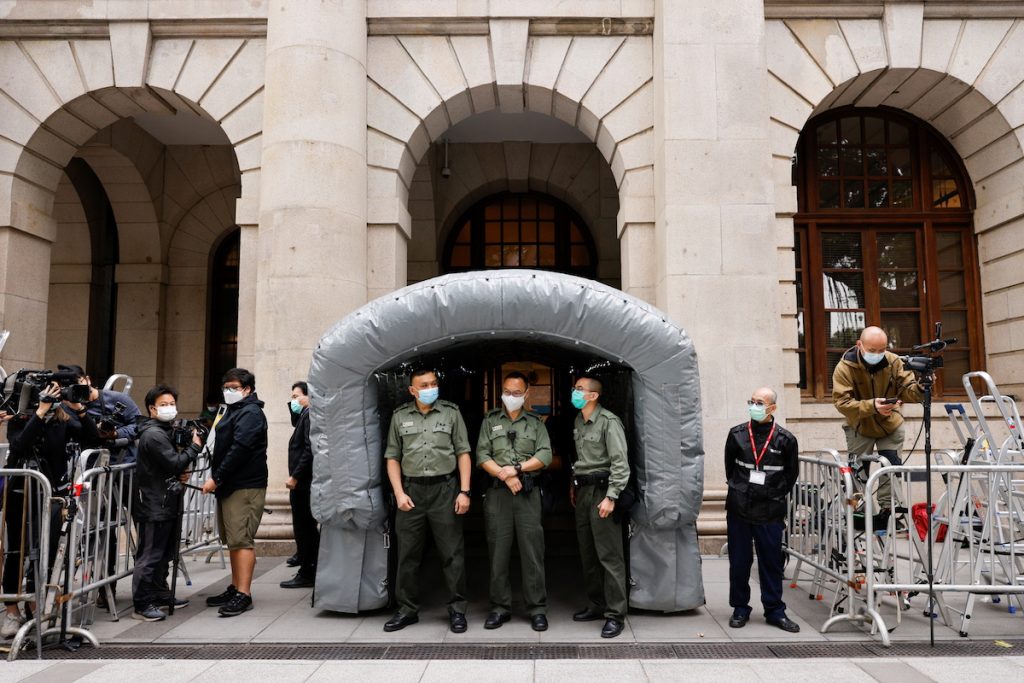Hong Kong’s top court denied bail on Feb. 9 to media mogul and Beijing critic Jimmy Lai, the most high-profile person to be charged under the city’s national security law.
Lai, 73, had been in custody since Dec. 3, except when he was released on bail for about a week late last year. He was granted a HK$10 million ($1.3 million) bail by a lower court on Dec. 23 only for the Court of Final Appeal (CFA) to bring him back into custody on Dec. 31 for another hearing following an appeal by the government.
His return to custody was related in part to Article 42 of the security law, which says that “no bail shall be granted to a criminal suspect or defendant unless the judge has sufficient grounds for believing that the criminal suspect or defendant will not continue to commit acts endangering national security”.
On Feb. 9, the CFA’s five judges said in a written judgment the lower court applied an “erroneous line of reasoning” and “misconstrued” Article 42. The decision was unanimous.
The judges said Lai’s team could make a “fresh application” for bail, as Feb. 9’s decision was of “a limited nature,” focusing on how the lower court arrived at its decision, rather than whether Lai should be bailed out or not.
Lai, wearing a dark grey suit and sporting his trademark buzz cut, stood in the dock impassively as the judges delivered their decision.
Outside the court, a small number of pro-Beijing protesters shouted “Jail Jimmy Lai for life … safeguard Hong Kong’s peace” through a loud-hailer. Inside, Lai’s supporters shouted “Hang in there,” and “Add oil,” an encouragement used frequently in Hong Kong.
Lai, a Catholic, was arrested in August when about 200 police officers raided the newsroom of his Apple Daily tabloid newspaper.
Beijing imposed the sweeping national security law on the former British colony last June after months of pro-democracy protests. The law punishes anything China considers subversion, secession, terrorism or collusion with foreign forces with up to life in prison.
The law has been condemned by the West and human rights groups as a tool to crush dissent in the semi-autonomous, Chinese-ruled city.

Prosecutors have accused Lai of breaching the law over statements he made on July 30 and Aug. 18, in which they allege he requested foreign interference in Hong Kong’s affairs.
Lai has been a frequent visitor to Washington, meeting with officials, including former Secretary of State Mike Pompeo, to rally support for Hong Kong democracy, prompting Beijing to label him a “traitor”.
Under the new law, the onus is on the defendant to prove they would not be a national security threat if released on bail. Under Hong Kong’s common law-based legal system, the onus has traditionally been on the prosecution to prove its case.
“We’ve lost the right to be presumed innocent until proven guilty,” said Avery Ng, a pro-democracy activist in the courtroom who himself faces illegal assembly charges related to mass anti-government and anti-China protests in 2019.
Lai stepped down last year as chairman of Next Digital, which publishes Apple Daily, a popular tabloid newspaper known for its feisty and critical coverage of China and Hong Kong.
He was born to a rich family in mainland China in 1947. His family suffered once the communists took power in 1949, with his mother being sent to a labor camp. At the age of 12 he was smuggled into Hong Kong. Cardinal Joseph Zen baptized him in 1997, the same year that the former British colony was returned to Chinese rule.
Lai has been a supporter of Cardinal Zen who is a vocal critic of the Chinese Communist Party and a controversial Sino-Vatican deal on bishop appointments on the mainland.
In December last year, Paris-based Reporters Without Borders honored Lai with a special prize for his courage in the face of “the sharp decline in press freedom in Hong Kong due to pressure from the Chinese regime.”
With Reuters.






